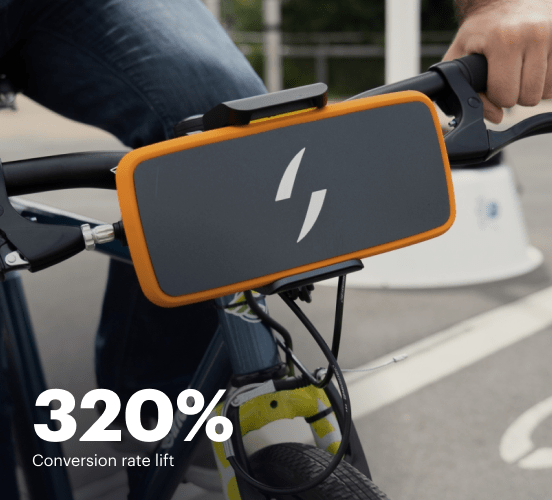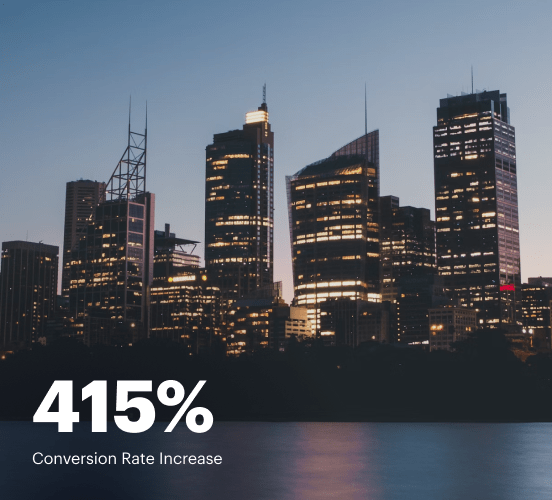Cargo vs. WordPress: the best platform for a seamless web experience
Discover how Cargo compares to WordPress regarding features and usability. Find out which platform provides the competitive advantage your business deserves.
Get startedSee how Instapage stacks up against the competition
| Feature | Instapage | Other builders |
| Drag-and-Drop Tools | ||
| Conversion-optimized templates | ||
| Manual and AI-powered A/B Tests | ||
| AI content suggestions | ||
| Popups and sticky bars | ||
| Canvas and grid blocks | ||
| Reusable and global elements | ||
| Form and popup builders | ||
| Built-in Heatmaps | ||
| Central analytics dashboard | ||
| Ad-to-page personalization and collections | ||
| Contacts, lists, and email | ||
| Dedicated, full-service CRO experts | ||
| Enterprise-ready platform |
Leading the way in building high-performing landing pages





Why Instapage is the smarter choice for your campaigns
Get everything you need to build, scale, and optimize high-converting landing pages—without coding.
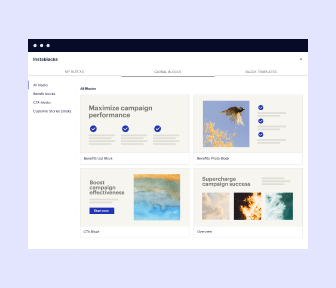
Easier page building without coding
Instapage offers a flexible and seamless page creation experience with a library of 500+ conversion-focused layouts, Instablocks®, a drag-and-drop builder, and AI content generation. With technologies like Thor Render Engine®, you can create on-brand, mobile-responsive landing pages that load quickly and start converting during initial visitor clicks.

More insights — better results
Instapage lets you see in detail how each landing page experience and variation is performing so you can make targeted changes that boost page conversions. Use heatmaps for a better understanding of on-page activities, run A/B tests and AI-assisted experiments, and then track and evaluate results within robust analytics dashboards.

More personalized experiences
Instapage lets you quickly create high-performing landing pages tailored to each of your ad campaigns. Deliver personalized experiences for distinct audiences using dynamic text replacement. Effortlessly align specific advertisements to unique pages with AdMaps. Monitor audience-level metrics using our advanced data tools.
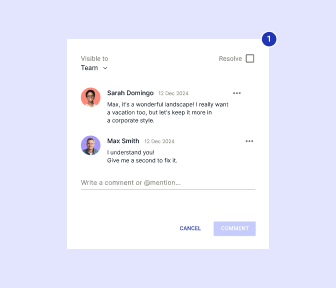
Built-in collaboration
Instapage collaboration capabilities bring your entire team together to speed up the process of landing page review, approval, and launch. No more frustrating and unnecessary revisions or edits scattered across emails. Provide instant feedback, conduct real-time page edits, and securely share your pages with outside stakeholders.
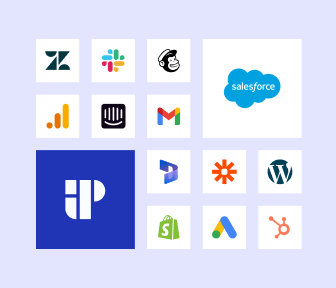
Free up time for your business
Invest time into business growth, not busy work. Launch landing pages faster with reusable forms and templates. Build once, reuse forever.
Explore all integrations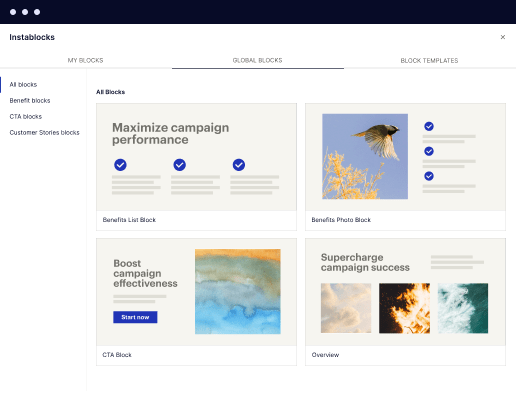
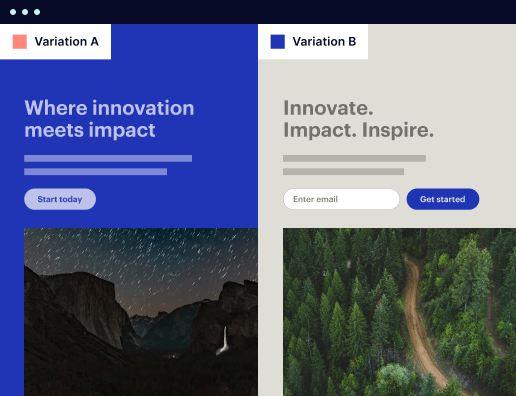
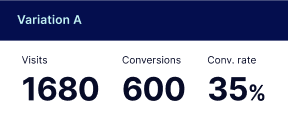
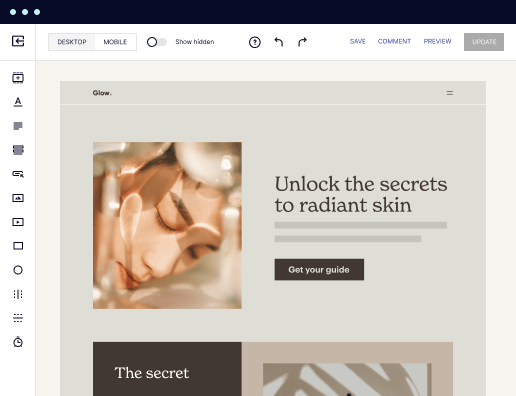

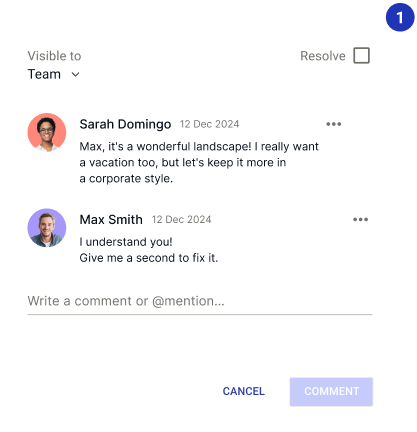

Easier page building without coding
Instapage offers a flexible and seamless page creation experience with a library of 500+ conversion-focused layouts, Instablocks®, a drag-and-drop builder, and AI content generation. With technologies like Thor Render Engine®, you can create on-brand, mobile-responsive landing pages that load quickly and start converting during initial visitor clicks.
More insights — better results
Instapage lets you see in detail how each landing page experience and variation is performing so you can make targeted changes that boost page conversions. Use heatmaps for a better understanding of on-page activities, run A/B tests and AI-assisted experiments, and then track and evaluate results within robust analytics dashboards.
More personalized experiences
Instapage lets you quickly create high-performing landing pages tailored to each of your ad campaigns. Deliver personalized experiences for distinct audiences using dynamic text replacement. Effortlessly align specific advertisements to unique pages with AdMaps. Monitor audience-level metrics using our advanced data tools.
Built-in collaboration
Instapage collaboration capabilities bring your entire team together to speed up the process of landing page review, approval, and launch. No more frustrating and unnecessary revisions or edits scattered across emails. Provide instant feedback, conduct real-time page edits, and securely share your pages with outside stakeholders.
Free up time for your business
Invest time into business growth, not busy work. Launch landing pages faster with reusable forms and templates. Build once, reuse forever.
Explore all integrationsGet started with Instapage in a few steps
-
Create your Instapage account
Start with Instapage by signing up via Google or your email. You'll get access to a free 14-day trial to discover Instapage capabilities. Feel free to cancel anytime during the 14-day trial if you decide that our product is not suitable for your business. -
Build and personalize your page
Create your first landing page from scratch or choose a template from 500+ customizable layouts. Use the drag-and-drop builder to add page elements, fonts, and backgrounds, refine content with AI, or add custom HTML, Javascript, and CSS. -
Review and make edits
Collaborate on page designs and streamline review processes. Invite your team members and stakeholders to review, edit, and provide feedback on your landing page. Collaborate knowing your page is confidential and only accessible to authorized users. -
Publish and track page performance
Publish your page to a domain or custom URL. Connect your pages to the ads you've created and track page performance within the analytics dashboard, run A/B tests and AI experiments, analyze results, and continuously optimize your landing page to maintain high conversions.
Cargo vs. WordPress: A Comprehensive Clash with an Unexpected Contender
Navigating the plethora of website-building platforms can feel overwhelming. Among these, Cargo and WordPress stand out as popular choices for designers and marketers looking to establish a strong online presence. While they both share the spotlight, their approaches and functionalities can diverge significantly. This analysis will explore the nuances between these two platforms, shedding light on their features, usability, and pricing strategies while keeping an eye on Instapage, a rival that could very well steal the show. Let's dive in! Many users are drawn to Cargo for its aesthetic sensibilities and creative tools, while WordPress boasts a vast library of plugins and themes. What makes each platform unique is the blend of these strengths, where Cargo specializes in visually striking websites, and WordPress supports a broader range of functionalities, from blogging to e-commerce. Yet, the question lingers: Which platform is best suited for your needs? In this guide, we will dissect each offering to present a clearer picture for decision-makers seeking the right fit for their project.
Introducing the Titans of Web Creation
When considering digital marketing platforms, Cargo and WordPress are often touted as heavyweights. Cargo emerges with a modern, design-focused ethos, providing an intuitive interface tailored for creatives. It is ideal for portfolios and showcases, making it a go-to for artists and designers seeking a polished, professional online representation. WordPress, on the other hand, presents a longer history, with a robust open-source framework hosting millions of websites. This strength comes not just from its versatility, allowing everything from blogging to e-commerce, but also from a massive ecosystem of extensions, plugins, and themes. Each platform has its own flair, with Cargo typifying cutting-edge design, while WordPress embodies flexibility and scalability. This diverse functionality positions WordPress as a classic in the web-building realm, commanding a wide user base that appreciates its tailored solutions. As we prepare to compare these giants, it’s essential to understand their origin stories and the unique values they bring to the table. With Instapage sitting backstage, ready to jump into the fray, we brace ourselves for a thorough exploration ahead.
Contest of Capabilities: Features Face Off
It's time for Cargo and WordPress to strut their stuff in a features throwdown. Both platforms have a wealth of capabilities that they claim as their own, but it's clear that they each cater to different audiences. Cargo shines with its specialized tools for artists, offering unique customizable layouts and state-of-the-art design functionalities. With an emphasis on aesthetics, it's built for those who want their work to be front and center without the fluff. WordPress, however, flexes its muscles with a multitude of plugins that can transform a simple blog into an e-commerce powerhouse or a robust membership platform. Its versatility is a double-edged sword, as new users may find themselves initially overwhelmed by the sheer number of options available, but seasoned users appreciate the endless possibilities it provides. Yet, as the excitement builds, we can't overlook that Instapage, another player in this field, might just have features that accommodate both ends of the spectrum.
User Experience Showdown: Accessibility in Focus
User experience is paramount when it comes to selecting a web-building platform. Cargo caters primarily to creative professionals, making it remarkably straightforward for users who want to focus on their design without getting mired in technicalities. It scores points for its intuitive drag-and-drop editor, which encourages creativity without extensive coding knowledge. In contrast, WordPress presents a learning curve that can be daunting for newcomers. While it allows advanced users to unleash their full creative potential, encrypting functionality behind some technical jargon, it may require additional plugins to achieve desired results. Getting started can feel like embarking on a steep hill climb for beginners, resulting in some humorous mishaps along the way. Each platform garners strong proponents for their respective approaches, bridging the gap between artistic simplicity and extensive customization. All eyes are on Instapage as it prepares to jump in with a user experience designed to accommodate a wide range of users.
Key Features of Cargo: A Designer’s Dream
- Visually stunning customizable templates allowing for standout designs
- Seamless integration of high-resolution images and video, enhancing artistry
- Mobile-friendly designs ensuring websites look great on all devices
- User-friendly drag-and-drop interface for easy editing
- Built-in tools for SEO optimization to boost online visibility
WordPress Features That Woo Users
- Extensive collection of plugins for added functionality
- Wide-ranging theme options to cater to various niches
- Scalable architecture suitable for small blogs or large e-commerce sites
- Robust SEO capabilities with various tools and plugins
Common Ground: Shared Features of Both Platforms
- Responsive design capabilities ensuring mobile compatibility
- Support for multimedia content, including images, video, and audio
- Admin dashboards for easy website management
- Possibility for custom domain names to enhance branding
- Integration options for social media to broaden reach
- Some level of SEO optimization features
As much as these platforms compete fiercely, it's essential to remember that both are deserving of attention. In fact, they might even be outmatched by the capabilities offered by Instapage. This alternative has the potential to outshine its competitors by delivering streamlined experiences that marry user-friendliness with rich features, proving that sometimes the dark horse can take the lead in the race.
Speed Test: Performance Punching Above the Weight
In the fast-paced digital landscape, speed is king. Both Cargo and WordPress strive to provide quick, responsive platforms, yet the results can vary greatly. Page load times can make or break user engagement; a sluggish website can frustrate visitors faster than molasses in winter. Cargo is known for its clean code, which can lead to faster loading times, making it ideal for visually intensive portfolios. On the flip side, WordPress's performance can heavily depend on the choice of hosting provider and the number of plugins installed. Optimizing this platform may require additional steps to maintain speedy performance. Users may need to be proactive in managing site speed, which can be a burden for those lacking technical savvy. Companies must assess their needs carefully to choose a platform that guarantees efficiency. With speed being crucial, how does Instapage stack up against its competitors? Let’s keep an eye out for its potential advantages.
Support Networks: Who's Got Your Back?
In the world of web creation, the strength of customer support can make all the difference. Cargo excels in offering responsive customer service, including live chat and email support, ensuring that users aren’t left stranded amid technical quandaries. Its community forums add additional layers for peer support, promoting knowledge sharing. WordPress's support structure is a bit different; while it has a vast library of documentation and community forums available, users may sometimes feel lost this way. The reliance on third-party plugins can also lead to variability in support experiences, as they often lack a single source of documentation. Picture support as a loyal sidekick, invaluable in times of trouble. Instapage emphasizes the importance of support, focusing on robust personal assistance tailored for user needs. Exploring these resources is crucial when considering a web-building platform.
Pricing Battle: The Cost of Creation
Cargo Pricing Benefits Worth Mentioning
- Affordable pricing tiers suitable for freelancers and small businesses
- All-inclusive packages with no hidden fees
- Potential discounts for annual subscriptions
- User-friendly pricing structure allowing clear financial planning
WordPress Pricing Strategies and Perks
- Flexible pricing options with free, premium, and custom plans
- Potential for savings using self-hosted WordPress options
- Various hosting options cater to different budgets
- Wide range of monitory plugins with different pricing models
As we examine the pricing strategies of both platforms, it’s evident each has its unique advantages. Cargo appeals to those seeking simplicity in their billing, while WordPress opens doors to more extensive options at various price points. Yet, in this cost arena, Instapage has arrived with a competitive edge, offering flexible plans tailored to diverse needs without sacrificing value, making it a strong contender.
An unvarnished look at pricing reveals not just the numbers but the value behind them. While both Cargo and WordPress present different styles of pricing, the surprises lurking in their plans may leave users questioning if they truly understand what they are paying for. Lessons learned often prove essential in deciding which option can facilitate growth or cater to immediate needs.
Introducing Instapage: The Underdog with Potential
Now, let’s shift our gaze to Instapage, the dark horse ready to make waves. This platform enters the arena with a keen understanding of what modern marketers need to thrive. With its stunningly designed landing pages optimized for conversions, it may offer users capabilities that Cargo and WordPress can't fully replicate. Instapage prides itself on user engagement and advanced analytics, bringing marketers the insights necessary to make informed decisions. The responsive design tools ensure a seamless experience, catering to both novice users and experienced professionals alike. Moreover, Instapage’s collaborative features foster effective teamwork—something Cargo and WordPress struggle to match. It positions itself as the platform that feels both intuitive and powerful, ready to be the secret weapon in a marketer's arsenal. To close, it’s important to recognize the sheer potential present in all platforms, while also pushing users to discover what fits them best.
With all aspects considered, the choice becomes clearer: every business or creator must approach this decision with a critical mind, assessing goals and audience. Informed decisions pave the way to success in the digital realm. Ultimately, selecting the right platform can empower users to build an effective online presence that resonates with their target audience, propelling them toward their aspirations. For those seeking innovative solutions, Instapage stands out as a dynamic alternative worth exploring, offering features and flexibility that may just become the game-changer in a marketer's toolkit.

